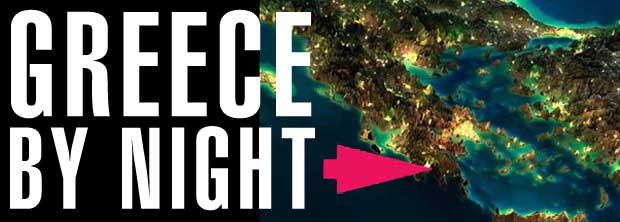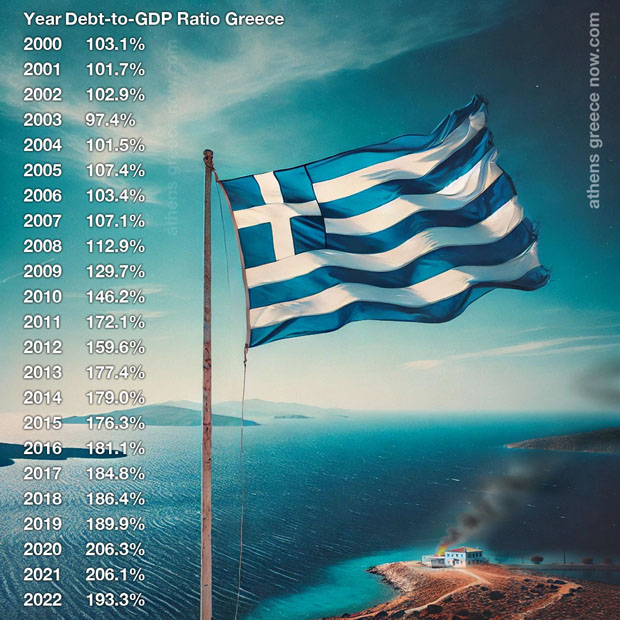Timeline History of the eurozone financial crisis
2009 – 2010
"When creditors finally noticed that Athens might be in a bit over its head back in 2009, Greece’s debt to GDP ratio was about 127%. Today Greece owes around $320 billion and its debt to GDP ratio is roughly 174%" – Forbes Magazine 2017
"Once in the thick of a debt crisis, Greece now leads the bloc’s growth as the country repays its multi-billion-dollar loans ahead of time..." – Fortune Magazine June 2024
Five Major Events leading to the Economic Crisis in Greece
1990s - 2000s
Excessive Government Borrowing sets the stage
Greece had been running high fiscal deficits and borrowing heavily for years to finance public spending. The country’s public debt steadily increased, with the debt-to-GDP ratio reaching alarming levels. Much of the borrowing was used to finance public sector wages, pensions, and large infrastructure projects, leading to an unsustainable debt burden.
2001
Entry into the Eurozone
Greece adopted the euro in 2001, which brought lower interest rates and easier access to credit. However, the country was not fully prepared for the fiscal discipline required by the eurozone. The adoption of the euro allowed Greece to borrow more easily, but it also meant that Greece could no longer devalue its own currency to regain competitiveness, contributing to imbalances.
2004
Endemic Underreporting of Government Debt
Greece misreported its deficit and debt levels to meet the criteria for entry into the eurozone. In 2004, it was revealed that Greece had underreported its budget deficit and public debt figures, which undermined trust in the country's financial statistics and led to greater scrutiny of its public finances by the European Union.
2007-2008
Global Financial Crisis Strikes
The global financial crisis in 2007-2008 exacerbated Greece’s vulnerabilities. As global financial markets tightened, Greece’s access to credit became more expensive, and the country’s already high debt levels became unsustainable. The crisis also led to a sharp economic contraction, which reduced government revenues and worsened the fiscal deficit.
2009
Greece’s True Debt Revealed
In October 2009, Greece's newly elected government, led by Prime Minister George Papandreou, revealed that the budget deficit was much higher than previously reported, at nearly 13% of GDP (later revised to 15.7%). This revelation triggered a loss of confidence in Greece's ability to manage its finances and led to a sharp increase in borrowing costs. This eventually led to the country's request for a bailout from the European Union and the International Monetary Fund (IMF) in 2010.
Timeline of Economic Crisis in Europe
2009–2010
Jan. 6, 2009 The Bank of Portugal predicts the country's economy will enter recession in 2009 for the third time in six years.
Jan. 16, 2009 Spain's government forecasts its budget deficit for the year will rise to almost double the E.U.'s target of 3 percent, while unemployment will jump to nearly 16 percent.
Feb. 5, 2009 Greece's government raises tax on cigarettes from 75 to 80 percent, and increases tax on alcoholic drinks by 20 percent.
Feb. 17, 2009 Stocks and currencies sink across Europe after Moody's Investor Service says deteriorating economic conditions in former communist countries could impact western Europe's already-stressed banking system.
March 1, 2009 German Chancellor Angela Merkel and other European Union leaders reject suggestions for a broad new multibillion euro bailout for eastern Europe, saying additional aid should be given to struggling nations only on a case-by-case basis.
March 5, 2009 The European Central Bank and the Bank of England, Europe's two leading banks, cut interest rates to record 10-year lows in the 16-country euro-zone. The new rate is the lowest in the 315-year history of the British central bank. The British bank also announces it will increase the money supply by buying assets such as government securities and corporate bonds, the first time quantitative easing has been use in modern Britain.
March 29, 2009 The Bank of Spain takes over a small regional savings bank, the first bank bailout in the country since the financial crisis began and the first such intervention since 1993.
April 14, 2009 Portugal's central bank predicts the country's economy will shrink by 3.5 percent in 2009, a sharp revision from its January forecast of a decline of only 0.8 percent.
April 27, 2009 The EU sets deadlines for France, Spain, Britain, Ireland and Greece to reduce their budget deficits to within the 3 percent of GDP limit required by the treaty that set up the euro currency.
May 15, 2009 First quarter output in Germany, the euro-zone's biggest economy, plunged 3.8 percent as demand for its cars and factory machinery collapsed. It is the country's biggest economic contraction since at least 1970.
June 15, 2009 Moody's downgrades ratings of 30 Spanish banks and building societies, citing the country's economic downturn and a big rise in non-performing loans. Banco Santander and BBVA, the country's two largest banks, retained their B rating in financial strength and AA1 rating for long-term debt, but were placed under review for possible downgrade in both categories.
June 26, 2009 Spain's government unveils a fund of up to 90 billion euro ($125.56 billion) to help banks restructure and cope with the effects of the recession.
July 2, 2009 Moody's downgrades Ireland's debt-rating to AA1 from the top AAA level and warned of another possible downgrade amid growing worries about the country's public finances and the cost of the government's bailout of the banking system. Moody's was the last of the big three ratings agencies to take the step.
July 7, 2009 The EU gives Poland, Hungary, Romania, Latvia and Lithania two- and three-year deadlines to reduce their budget deficits.
Aug. 13, 2009 France and Germany, Europe's two biggest economies, each report 0.3 percent growth in the second quarter compared with contractions of 1.3 percent ant 3.5 percent respectively in the previous three-month period.
Aug. 14, 2009 Spain reports its fourth consecutive quarterly retraction, reporting its economy shrank by 1 percent in the second quarter compared with the previous three months and by a record 4.2 percent over the year.
Sept. 30, 2009 Spain's Economy Ministry says the country's budget deficit for the first eight months of the year has swollen to 5.73 percent of gross domestic product, four times its level for the same period in 2008.
Oct. 4, 2009 Greek voters oust Prime Minister Costas Karamanlis from office halfway through his second term, returning the Socialists to power after five years of conservative governance. Former foreign minister George Papandreou will lead the new government and will have to find ways to rebuild the country's sagging economy.
Oct. 7, 2009 The European Commission criticizes Germany, Italy, the Netherlands and six other EU nations for running budget deficits above the limit of 3 percent of gross domestic product, warning them it might take legal action ordering them to bring to bring their deficits under the limit by a target date.
Oct. 16, 2009 Newly elected Greek Prime Minister George Papandreou admits Greece's economy is “off the rails” and acknowledges this year's budget deficit will be around 12 percent of the country's gross domestic product, well above the 3 percent maximum fixed by EU budget rules and more than double the previous projection.
Nov. 13, 2009 The 16-country eurozone exits its sharpest recession since World War II, showing its first increase in output in six quarters, after 3rd quarter figures show its economy grew by 0.4 percent in the third quarter.
Dec. 2, 2009 Moody's says worries that the Greek government may be exposed to a liquidity crisis in the short-term are "misplaced" though it cautioned about longer-term dangers to the economy.
Dec. 8, 2009 Fitch Ratings reduces Greece's debt rating from A- to BBB+, the worst in the euro zone.
Dec. 9, 2009 Ireland slashes pay for state workers, cuts welfare benefits and imposes new fuel taxes as it unveils a record 4 billion euro ($6 billion) in budget cuts to reduce its runaway deficit. The plan is Ireland's biggest budget cut in history.
Dec. 14, 2009 European Union regulators approve Britain's bailout of the Royal Bank of Scotland PLC, which will receive the "largest amount of state aid ever received by any company in the European Union's history."
Dec. 14, 2009 Greece's prime minister announces barrage of spending cuts including a reduction in defense spending, slashing bonuses in the public sector, reducing social security and government operating expenditure by 10 percent each, and salary caps for public utility direcctors. He also calls for taxes of up to 90 percent on large bonuses for private bankers, and eliminating cost-of-living increases for public sector workers with salaries of more than 2,000 euro ($3,000).
Dec. 16, 2009 Standard & Poor's downgrades Greece's credit rating, cutting it from A1- to BBB+ with a negative outlook.
Dec. 22, 2009 Moody's becomes the third rating agency to downgrade Greek government bonds this month, dropping them from A1 to A2.
Dec. 24, 2009 Greece's parliament approves an austerity budget for 2010 aimed at fulfilling its promise to reduce the country's budget deficit from a projected 12.7 percent GDP in 2009 to below 9.4 percent in 2010.
Dec. 28, 2009 Spain's Economy Ministry says the country's budget deficit for the first 11 months of the year ballooned to 6.79 percent of GDP, five times that of 2008.
2010
Jan. 8, 2010 Greece's government raises taxes on cigarettes and alcohol.
Jan. 12, 2010 Eurostat, the EU's statistics arm, says Greece's goverment budget figures are unreliable and appear to have been falsified to downplay the country's budget crisis.
Jan. 25, 2010 Greece raises 8 billion euro ($11.3 billion) in oversubscribed sale of government bonds, its first issue of the year.
Jan. 26, 2010 Britain's Office for National Statistics says the British economy grew 0.1 percent in the final quarter of 2009, meaning the country officially exited its worst recession since World War II. It is the last of the major economies to emerge from the downturn.
Jan. 27, 2010 Portugal's finance minister says the country's budget deficit likely reached a record 9.3 percent of gross domestic product in 2009, far above the EU rule of 3 percent.
Jan. 29, 2010 Spain announces its budget deficit soared to 11.4 percent of gross domestic product, above an earlier estimate of 9.4 percent.
Feb. 2, 2010 Greece announces additional austerity measures including a freeze on civil service pay, increased fuel taxes, an increase in the retirement age and an accelerated overhaul of the country's tax system.
Feb. 4, 2010 Greek customs and tax officials strike for 48 hours, the first strike against the government's austerity program.
Feb. 24, 2010 Greek unions stage a nationwide strike, the first general strike since the government's election in October.
March 3, 2010 Greece announces an additional 4.8 billion euro ($6.5 billion) in spending cuts.
March 16, 2010 Standard & Poor's says it's no longer considering a downgrade of Greece's credit rating.
March 24, 2010 The euro sinks to a 10-month dollar low after Fitch Ratings downgrades Portugal's debt, warning that the country's prospects for recovery are weaker than its peers in the euro zone.
March 25, 2010 Portugal's minority government and the main opposition party agree on an austerity plan designed to reduce the country's debt burden and avoid following Greece into a deeper financial crisis.
March 31, 2010 Moody's credit rating agency downgrades five Greek banks.
April 9, 2010 Fitch Ratings slashes Greece's debt rating saying managing the economic crisis is now increasingly out of the country's control.
April 14, 2010 The EU's economy commissioner warns Portugal that it may need to make additional budget cuts to stave off further financial turmoil.
April 22, 2010 Moody's Investor Services downgrades Greece's sovereign debt and warns of further downgrades after Eurostat revised the country's deficit and debt figures upwards, saying Greece's budget deficit stood at 13.6 percent of GDP rather than the previously predicted 12.9 percent.
April 23, 2010 Greece formally requests bailout loans from the 15 other eurozone goverments and the International Monetary Fund.
April 27, 2010 Standard & Poor's downgrades Greek bonds to junk status and lowers Portugal's credit rating two notches to A-.
April 30, 2010 Moody's Investor Services downgrades its ratings on nine Greek banks, lowering their deposit, debt and financial strength ratings, and warning the debt and deposit ratings may be downgraded again.
May 3, 2010 European governments and the International Monetary Fund commit to 110 billion euro ($145 billion) emergency loan package for Greece to keep the country from defaulting on its debts and prevent its financial crisis from infecting other indebted countries just as Europe is struggling out of recession. It will be the first ever bailout of one of the 16 euro-zone countries.
May 3, 2010 The European Central Bank suspends credit rating limits on Greek debt until further notice, ensuring that Greek debt can be used as collateral in ECB lending operations despite its credit rating.
May 5, 2010 Moody's warns Portugal it may downgrade its AA2 debt rating in the next three months even as the government succeeded in raising 500 million euro ($654 million) on the bond markets.
May 7, 2010 The German parliament approves granting as much as 22.4 billion euro ($28.6 billion) in credit to Greece over 3 years, part of the wider 110 billion euro package by euro zone members and the IMF approved earlier this month.
May 9, 2010 The Federal Reserve opens a line of credit to Europe, a program to ship U.S. dollars overseas to head off a broader financial crisis on the continent. Other central banks are also involved. The move comes after the European Union and the International Monetary Fund agree to create a nearly $1 trillion rescue fund to support European nations burdened by heavy debt.
May 10, 2010 The European Union puts together a rescue program nearing $1 trillion aimed at preventing the Greek debt crisis from spreading to Spain and beyond, crushing the euro, stock markets and global recovery.
May 11, 2010 The German government approves its share of the $1 trillion rescue package for the euro.
May 12, 2010 Spain announces a 5-percent wage cut for civil servants, part of a deficit-reduction plan to ease worries the country will slide into a debt crisis like that of Greece.
May 13, 2010 The euro slides back near 14-month lows at $1.2586, within a cent of where it was just before the $1 trillion European Union bailout.
May 13, 2010 Portugal announces a hike in taxes and government spending cuts in a fresh effort to allay market fears about its high level of debt.
May 14, 2010 The euro sinks to a 19-month low of $1.2355, close to what would have been a four-year low against the dollar, on renewed worries over the European debt crisis.
May 17, 2010 The euro trades as low as $1.2275, a four-year low against the dollar.
May 18, 2010 The EU passes new rules requiring lightly regulated hedge funds to register with regulators and to demonstrate they have enough reserves to cover losses on risky trades. Germany unilaterally announces curbs on traders of government debt and bank stocks until March 31, 2011. The euro hits a new four-year low of $1.2162 against the dollar.
May 19, 2010 Greece staves off bankruptcy, using billions of euros from the EU and IMF rescue loans to pay off its creditors. The euro records another new four-year low of $1.2146 in response to Germany's new trading ban.
May 21, 2010 German's parliament approves their country's share of the massive eurozone rescue package.
May 25, 2010 Queen Elizabeth II delivers a somber austerity message to Parliament outlining the new coalition government's plans to reduce Britain's record $235 billion (163-billion-pound) budget deficit.
May 25, 2010 Italy's government proposes 24 billion euro ($30 billion) in budget cuts for the 2011-2012 period, including a three-year wage freeze for public workers and pay cuts for highly paid public servants.
May 28, 2010 Fitch Ratings downgrades Spain's debt from AAA to AA plus, the second downgrade of its credit rating in a month.
June 1, 2010 The euro hits another four-year low against the dollar, trading at $1.2112, its lowest since it sank as far as $1.2029 in April 2006.
June 3, 2010 Several Hungarian government officials say the country is facing a Greece-like fiscal crisis. Hungary already received a bailout of 20 billion euros ($27 billion) from the IMF and others in late 2008.
June 4, 2010 The euro falls as low as $1.1956, its weakest level since March 2006
June 7, 2010 The European Union and the International Monetary Fund set up a 750 billion euro ($1 trillion) bailout fund that could rescue any member of Europe's currency union from default. The euro hits another four-year low, falling as low as $1.19.
June 8, 2010 Fitch Ratings warns that Britain faces “formidable” fiscal challenges, noting the country's primary deficit is almost twice as large as during economic downturns in the 1970's and early 1990's.
June 14, 2010 Moody's Investors Service slashes Greece's debt to junk status.
June 16, 2010 Spain embarks on shaking up its economy with labor market reforms designed to encourage companies to hire, enacting long-awaited structural changes as it struggles to reassure markets and investors.
June 17, 2010 European Union leaders agree to go public with the results of “stress tests” checking the stability of the bloc's banks, an attempt to restore confidence to markets spooked since Greece demanded a bailout to prevent an embarrassing default.
July 13, 2010 Irish Prime Minister Brian Cowen promises three more hard-cutting budgets through 2013 that are expected to include new taxes on property and water.
FROM THE AP.ORG HISTORY OF THE GREEK CRISIS
"Greek exit could end democracy in Greece" – July 22, 2012
Is the Greece Crisis Finally Over? - Yahoo - September 2017
"Popular Santorini received over 600 cruise boats in 2016. On some days, nearly 20,000 cruise ship passengers would disembark, overwhelming the small island. In response, Santorini joins other popular vacation destinations like Venice and Barcelona, in restricting the number of tourists who can enter each day. Tourism is 24% of Greece’s GDP. 8 in 10 new jobs were created through the tourist sector."
See also:
Related:
2011 – Creating the European Financial Stability Facility (EFSF) & the "PIIGS"
2017 – Another Greek Economic Crisis?
The Drachma almost returned to Greece 2013–2017
Greek economic Survival in the 1990s



Greece's Golden Visa program


